Currently reading
American Spirit

As someone who is often put off by an overabundance of "style," I began doubting my ability to finish this book on p. 2 with the description of a gas station restroom that begins, "If you were tracking left to right in here, things would look like this as you drifted along making sense of it: empty paper towel dispenser with just a tiny torn tag of why-bother hanging from the stoic slit of its chipped metal grin; then the scratched-up, dented, bereft vending machine..." Something about the bloated verbiage of that paper towel dispenser really made me want to stop right there, in the second paragraph.
My advice for anyone with a similar reaction? Get through the first chapter. The style does stay fairly consistent throughout, but it also develops a natural rhythm (and stops being about gas station restrooms). It's kind of the stream-of-consciousness narrative of a man in crisis—or rather crises, most at least partly of his own creation. While Matthew has difficulty forming coherent sentences and behaves much of the time like a full-bodied myoclonic jerk, you gradually come to appreciate that this was once a functional human being (though I wouldn't have minded a little more evidence of that) who's just really overwhelmed by life right now.
And if you accept that this is ultimately a fable of survival rather than a documentary of a futile downward spiral, it may be easier to enjoy the humor, which I think Alan Tudyk should bring to life if they make a movie out of the book.
Rampant

Given the series is called “Killer Unicorns,” I expected a little more campy action and a little less sitty-talky-nothing-doing. Explore teen-age sexual politics and nefarious corporations as much as you want, but for gosh sakes, put in some frickin’ unicorns! And make them scary! And describe the damn things a bit more so I’ll remember they’re scary!
And, as is often the case, this book suffers from its weak first-person narration. There are other characters with better personalities and back-stories, and arguably a lot smarter as well, but everything gets filtered through one of the least exceptional people in the story (who is continually told she IS exceptional).
If nothing else, third-person narration (or some combination of first and third, even) would have allowed us to experience the horror of a unicorn attack from the POV of a desperate farmer or a lonely hitchhiker, which would have been way awesomer. As it is, everything seems to happen at too far of a remove.
I'm happy to overlook non sequitur plotting and poor character development if it's fun, but this was a case study in missed opportunities. Still....killer unicorns!
Working for the Devil
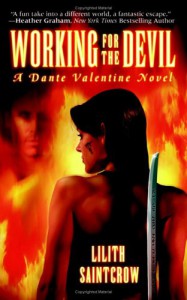
If you’re going to write a complex and difficult lead character using first-person narration, you’d better be pretty darn good at it, or the character may come off as erratic, unsympathetic, and ultimately render the entire plot unbelievable. For example, given her volatile mood swings and lack of impulse control, I find it impossible to believe that Dante Valentine has the discipline of mind necessary to be a world-class Necromance. Given her egocentric view of the world and propensity for lashing out at everyone she encounters, I find it impossible to believe that she inspires such loyalty from everyone around her, including a powerful demon who’s known her all of a week or two but claims she treats him with greater decency than anyone he’s ever known.
This character has apparently been through a lot in life, particularly in the last few years, and everyone who knew her when would still move heaven and earth for her. And yet, it doesn’t sound like she was any more emotionally stable then, either. So if there’s going to be no introspection or logical thought progression on the part of the character narrating her own story, this is where an author needs to show us how others see her, because she’s doing nothing to charm the pants off the reader on her own.
And while I have other complaints (like the terrifying and sinister villain of unspeakable evil who’s haunted her dreams for years but turns into a total Chatty Cathy info dump when he finally does turn up), this is where the story really falls short for me, because Dante “Danny” Valentine pays very little attention to the emotional lives of those around her, and when she does bother to wonder what someone’s thinking, she’s either jumping to conclusions that make no sense or finding the object of her curiosity utterly inscrutable. She’s as insulated from empathy as a psychopath and yet is constantly spewing her own emotional turmoil at the world, often violently. Which means much of what happens is tiresome and makes no sense whatsoever.
All of which could still be interesting, if it were being told from a more objective viewpoint instead of being filtered through the neurotic herself. You just never get a break from this nutjob!
It gets two stars because it clipped along at a decent pace and, if I pretend it’s not kicking off an interminable series of books featuring this madwoman, I like to imagine that the author wrote the entire book with a Post-It note on her desk that read, “Danny Valentine IS the monster!”
Riveted (A Novel of the Iron Seas)

Well, that was a huge improvement over The Iron Duke. The first chapter or two dragged brutally owing to the insertion of exposition after every single line of dialogue or present-day action (and there was a little of that at the end, too, with clunky recapping of stuff that happened elsewhere, though the plot relied far less on that here than in The Iron Duke), but then the obligatory world-building-for-newbs became less intense and you were left with two sincere people falling in like with each other.
Annika is delightfully uncensored in expressing her thoughts and feelings, and there are some interesting undercurrents concerning the ways families and tight-knit communities, and of course society as a whole, choose to define (and confine) individuals. --vague spoiler ahead-- David is a deeply good person (although there's one point where he doesn't show much imagination when he has a moral decision to make, but he kind of gets a pass because later he alludes to that moment and how you wake up one day with a better idea about how to handle a situation, but by then it's too late, and you know he's haunted by his actions, and you know he was tired and desperate when he made that questionable decision, and then you only feel sympathy for him) who is dealing with some deep-seated issues caused more by how society as a whole perceives and reacts to him than any physical injury he has sustained.
This isn't entirely four-star writing, but Brook has such interesting ideas at the root of her stories and this was definitely a four-star romance (with distractingly inaccurate cover art—put a brown paper bag over it or read the ebook!).
The Devil All the Time

So many characters in this book were totally messed up and/or depraved that it was kind of counterproductive. I mean, I just wasn't very interested or disturbed by any of it—not because I so quickly became inured to it, but more because there was little to contrast it against.
It was kind of like a stroll through a trash heap. Yeah, it's a bit icky, but only enough for me to think, "Why am I subjecting myself to this?" But if I were to sit down to breakfast on some nice white linens only to find maggots in the peaches on my cottage cheese, that would have a better shot at producing a visceral reaction.
I'm just sayin', there are ways to do dark material so it's disturbing and ways so it's titillating (even gleeful), and this was neither. Maybe that was the point: bad behavior is ultimately the most boring thing on earth. Or maybe Arvin was supposed to be the contrast, but he just wasn't central enough to pull it off. I don't know, I just had no measurable response to this book.
Master Of Crows
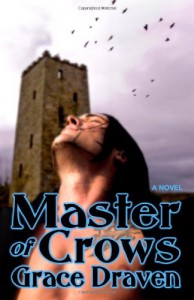
While it has fantasy elements, this is a romance first and foremost. In the fluff I read immediately prior to this, the romance was lust-fueled: Man wants woman and must possess her, but eventually realizes she has a good mind and heart as well; woman is so desperate for it she falls in love based on fervor and virility alone. This book, however, had more of a Jane Eyre, slow burn quality: Man’s not too impressed by the “drab” creature inhabiting his house, until he realizes she’s smart and funny and a hard worker, and of course when he finds out her frumpy clothes are hiding a beautiful body, it’s all downhill from there.
So yeah, I totally bought the friendship/mutual respect basis for their relationship. And I appreciated that the heroine dove into the sexual relationship headfirst (not literally, if I recall correctly—but she didn’t have terrible insecurities about not being beautiful or her slave status or anything [don't worry, she wasn’t his slave—that would be icky!]). Then the sex got to be a little too much; the author had been doing so well creating likable characters, and that kind of went out the window for a while so they could give each other rugburns day and night.
And then the “plot” really took over, and that was a little sparse, though there were some good moments there as well. Anytime the god Corruption manifests, it’s pretty creepy. And anytime the heroine and the servant and the dog are in the same room, I just want to nestle in there with them. Pretty awesome for a self-published author (I think—that's what I read someplace, anyway!). Only $2.99 for the ebook. I definitely can see myself reading this book a second time and watching for more by Grace Draven.
The Iron Duke (A Novel of the Iron Seas)

I'd been doing a little too much "eat your vegetables" reading, which means I hadn't been eager to read because it felt like more homework, which means I just wasn't reading for pleasure. So I sought out some escapist literature, and I can't fault this book for trying to give me that. But I was still left wanting more.
This is one of those books that has a some solid core elements (interesting world, interesting character backstories [at least alluded to]) that never seem to come together into a compelling narrative. The characters soon became defined by their bland relationship to each other rather than their unique histories, and the plot seemed to be driven by the actions of peripheral characters who barely (or never) entered into the story, so it became difficult to keep track of what was happening and why (because so much of it was happening someplace else). The writing was competent, but rarely compelling, and I always felt like I was skimming the surface of the story; it just never sucked me in.
Nonetheless, and contrary to most of the covers, the Iron Duke is a burly man with chest hair (think Ray Stevenson), which is a refreshing change from the full-body-wax, prepubescent look so popular in leading men today, the heroine had decent critical thinking skills, and the world was interesting enough. The truth is, I only read this because it was supposed to be valuable "world-building" for a later book that sounded more interesting to me, and I'm still keen to read that one. I think Meljean Brook has proven that she can interest me, even if true escapism is still a ways off.
Three-Ten to Yuma and Other Stories
 My first Elmore Leonard, and while I had heard that his writing style was rather pointedly minimalist, I found it so sparse that a couple times I wasn't even sure what had just happened. But I seemed to enjoy the later stories more than those earlier in the book, which may indicate there was a bit of a 'learning curve' to reading his work. Once I got into the stories, it seemed like there was often a small twist at the end that made me think, "THAT was the point of this story?" Different than a lot of short stories I've read in that the twist was so distracting that I didn't wonder what happened to the characters at all; it was almost like the twist completely erased all that had gone before, so I didn’t have any unresolved tension. I don't like feeling manipulated by modern short stories, but I guess I do like the unresolved tension that leaves me thinking about them long after I've stopped reading. For that reason, some of these stories missed their mark for me.Still, I'd probably like to try a novel by Leonard.
My first Elmore Leonard, and while I had heard that his writing style was rather pointedly minimalist, I found it so sparse that a couple times I wasn't even sure what had just happened. But I seemed to enjoy the later stories more than those earlier in the book, which may indicate there was a bit of a 'learning curve' to reading his work. Once I got into the stories, it seemed like there was often a small twist at the end that made me think, "THAT was the point of this story?" Different than a lot of short stories I've read in that the twist was so distracting that I didn't wonder what happened to the characters at all; it was almost like the twist completely erased all that had gone before, so I didn’t have any unresolved tension. I don't like feeling manipulated by modern short stories, but I guess I do like the unresolved tension that leaves me thinking about them long after I've stopped reading. For that reason, some of these stories missed their mark for me.Still, I'd probably like to try a novel by Leonard.
Frankenstein: Prodigal Son: A Novel
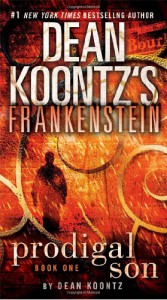 I think I'm done with "modern" Dean Koontz. His storytelling feels mechanical and uninspired, while character development is weak (not that it was ever intended to carry his books). This particular story lacked suspense or excitement, which left me wondering why I was reading it at all. It probably would be fine as a TV movie, as it would only occupy 85 minutes of one's life and ask no intellectual engagement of the viewer.
I think I'm done with "modern" Dean Koontz. His storytelling feels mechanical and uninspired, while character development is weak (not that it was ever intended to carry his books). This particular story lacked suspense or excitement, which left me wondering why I was reading it at all. It probably would be fine as a TV movie, as it would only occupy 85 minutes of one's life and ask no intellectual engagement of the viewer.
How Green Was My Valley
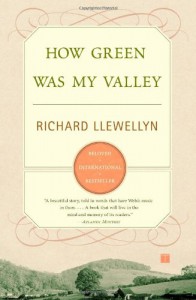 Kind of a downer. Labor and environmental issues and patriarchal society, and I felt like there were a lot of unresolved issues at the end, considering the narrator was looking back from 30 years or more on. Glad I read it, but I need something a little lighter now, I think.
Kind of a downer. Labor and environmental issues and patriarchal society, and I felt like there were a lot of unresolved issues at the end, considering the narrator was looking back from 30 years or more on. Glad I read it, but I need something a little lighter now, I think.
Destiny of the Republic: A Tale of Madness, Medicine and the Murder of a President
 This book made great strides in reforming my feelings on nonfiction. It has romance and humor, murder and malpractice, genius and madness, egos of outlandish proportions contrasted with unlikely heroism. If I had read this book in high school (you know, 20 years before it was written), I might have ended up a history major.
This book made great strides in reforming my feelings on nonfiction. It has romance and humor, murder and malpractice, genius and madness, egos of outlandish proportions contrasted with unlikely heroism. If I had read this book in high school (you know, 20 years before it was written), I might have ended up a history major.
Please Look After Mom
 I liked the unusual storytelling format—second-person narrative of one child, then third-person narrative of another, then second-person of the father, then first-person of the mother—if only for its novelty. I'm not sure I understand why the story is told that way or what it's meant to accomplish, but it kept me interested. It felt fairly brave, and not as much like a "Choose Your Own Adventure" novel as I had feared. Unfortunately, I found the structure of the novel more engaging than the story itself. The premise is interesting, but the farther I got in the book, the less I cared about the central mystery (which is just as well, since it's never solved). When I got to the rather lengthy epilogue, I was beginning to lose patience with the book.
I liked the unusual storytelling format—second-person narrative of one child, then third-person narrative of another, then second-person of the father, then first-person of the mother—if only for its novelty. I'm not sure I understand why the story is told that way or what it's meant to accomplish, but it kept me interested. It felt fairly brave, and not as much like a "Choose Your Own Adventure" novel as I had feared. Unfortunately, I found the structure of the novel more engaging than the story itself. The premise is interesting, but the farther I got in the book, the less I cared about the central mystery (which is just as well, since it's never solved). When I got to the rather lengthy epilogue, I was beginning to lose patience with the book.
The Guernsey Literary and Potato Peel Pie Society

The early parts that focused on the formation of the literary society were engaging. I enjoy watching people learning to connect with literature and seeing how people come to identify with different works. I also enjoyed learning a little about the occupation of Guernsey and what the wartime experience was for its inhabitants.
I did find it a little hard to connect with the characters in general, partly because of the epistolary structure and partly because of a somewhat unfocused story arc. The letters themselves seemed to strain reality, with one character regularly rushing off to the telegraph office to send someone the 1940s equivalent of "OMG! I M totes in <3 w/D!" Did people really do that? It may have been necessitated by the epistolary structure, to provide some indication of her thoughts on events as they transpired, but it still felt weird. The false notes seemed more prevalent in the second half of the book than the first, and I couldn't help wondering, rather guiltily, how many were contributed by the niece.
Overall, though, I found it a pleasant enough read. I just doubt I'll remember anything about the characters in a few weeks.
Dark Places: A Novel
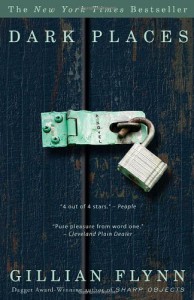 The subject matter wasn't too dark for my tastes, the main character was pleasingly off-kilter (if inconsistently portrayed), and I'm willing to suspend all sorts of disbelief for the sake of story. Unfortunately, I just didn't find the story compelling as told. There was some potential, but largely unrealized. None of the characters seemed fully developed (and there were only a couple I had enough interest in to wish that they would be better developed). I felt no sense of place, and little tension. My curiosity was never piqued, so I really didn’t care who killed these people for most of the book.
The subject matter wasn't too dark for my tastes, the main character was pleasingly off-kilter (if inconsistently portrayed), and I'm willing to suspend all sorts of disbelief for the sake of story. Unfortunately, I just didn't find the story compelling as told. There was some potential, but largely unrealized. None of the characters seemed fully developed (and there were only a couple I had enough interest in to wish that they would be better developed). I felt no sense of place, and little tension. My curiosity was never piqued, so I really didn’t care who killed these people for most of the book.
Road From Coorain
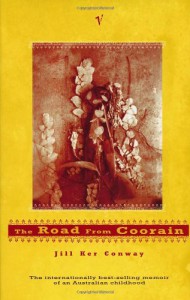 I wasn't passionately underwhelmed, just largely disinterested. Few specifics to latch on to here; it felt like a chronological recitation rather than compelling storytelling. Memoir is not really my favorite, though, so I'm not the target audience.
I wasn't passionately underwhelmed, just largely disinterested. Few specifics to latch on to here; it felt like a chronological recitation rather than compelling storytelling. Memoir is not really my favorite, though, so I'm not the target audience.
Dragon Bound (A Novel of the Elder Races)

It's an easy read without much plot. I found the heroine interesting as the embodiment of an herbivorous soul, because she does seem to project an oddball mix of mindless flight and deer-in-headlights immobility, and her reflexively erratic responses to being in the power of a predatory male do make sense within that context. So I appreciated the author's attention to character in that respect. But I have to say I wasn't very interested in the dominant, all-powerful hero. He seemed pretty two-dimensional for a creature that's supposed to be millions or even billions of years old (and you thought the Buffy/Angel age difference was a little creepy). Which also could make sense—if you live long enough, I imagine at some point you may stop expanding intellectually and start collapsing back in on yourself. I just found it difficult to believe he'd only gotten bored in the last few centuries, and that somehow a goat-brained woman was now utterly fascinating to him. Initially it made a little sense, because at first he didn't know her unpredictable behavior was due to goat-brainedness, but his fascination never wore off. And her attraction was based entirely on his overwhelming maleness, which she knows she shouldn't be so into, but she just can't help herself. Reeeeeeally? I just couldn't get into them as a couple.









